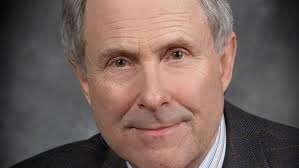“In the quest of tolerance for and protection of all, we are losing perspective.”
Washington, DC - It is always a bit scary to see an intellectual/commentator publicly destroyed.
And doubly so if you are also a writer/journalist with intellectual pretentions and an “edgy” style of analysis and observation.
Thus reading from afar l’affair Flanagan leaves an American with shudders regarding how words can incinerate--and one’s own words being even more incendiary than could have been conceived when uttering them.
 Thus Tom Flanagan’s musing, off topic response to a Q&A, regarding whether viewing (not creating, circulating, let alone participating/implementing) child pornography/pedophilia justified a prison sentence has destroyed his career. Virtually instantly CBC dropped him as a commentator and the University of Alberta announced his retirement. So toxic is his name that reportedly an article he coauthored on a totally different political topic was withdrawn from publication--even when Flanagan offered to remove his name from the article.
Thus Tom Flanagan’s musing, off topic response to a Q&A, regarding whether viewing (not creating, circulating, let alone participating/implementing) child pornography/pedophilia justified a prison sentence has destroyed his career. Virtually instantly CBC dropped him as a commentator and the University of Alberta announced his retirement. So toxic is his name that reportedly an article he coauthored on a totally different political topic was withdrawn from publication--even when Flanagan offered to remove his name from the article.
If Flanagan had been revealed as a CIA operative specializing in water-boarding, the public shamming could hardly have been swifter.
Thus learning to identify the intellectual “third rails” in sociopolitics is as vital for maintaining credibility as mastering content analysis and rhetoric. In the annual U.S. government human rights report, one category is “self-censorship” as practiced by journalists in hostile political environments. Clearly, self-censorship is a journalistic reality regardless of the society.
But that leads to a more general topic. Just what are the evolving “no go” areas in society?
It is clear that there are tsunami dimension changes in society over the past generation.
Permit me to note a few particulars in the United States (although many would also be reflected in Canada). In the 1950s for a boy from Scranton, Pennsylvania, homosexuals didn’t exist. One didn’t even know that there was a “closet” from which LGBT individuals might emerge. Indeed, one of the verses from a University of Pennsylvania school song (Drink a Highball) went, “So tomorrow may bring sorrow, so tonight let’s all be gay.” The verse is now sung a little defensively. And even when the closet was opened, the concept of “gay marriage” was viewed as ludicrous. But in a recent “advice” column, the questioner asked whether he should give up his gay lover because his other gay friends (Democrats) rejected his lover for being Republican.
Or mind-altering substances. Once these were limited to alcohol, but by the 1960s-70s, they included marijuana and LSD; cocaine and “crack” were still 20 years into the future, and the miracles of pharmacology weren’t even imagined by chemists. So far as alcohol was concerned, “one for the road” was once standard--slowly revised as “make ‘one for the road’ coffee.” The consequence was a wide-awake drunk, but while penalties against drunken driving have become draconian, and the “designated driver” a standard adjunct to party groups, concern about other drugs appears tertiary. Indeed, the once ubiquitous cigarette is probably less acceptable in many circles than a “line” of cocaine.
Or spousal abuse. As a boy, one was aware of “wife beating”--but that was a practice limited to drunken industrial workers and/or miners. So it was a stunning revelation in the mid-1960s to hear a member of our wedding party was regularly beaten by her upper class, fellow graduate student husband. But today, the aforementioned USG human rights reports detail each country’s attitudes toward/laws against/prosecution of spousal abuse.
And pornography was much debated as in the “I can’t define it but know it when I see it” optic. American publication of the D.H. Lawrence classic, Lady Chatterley’s Lover” was a literary breakthrough. The “edgy” publication of the 1960-70s was Playboy wherein sophisticated photography presented lubricous, girl-next-door young women in what today would not even rate “R” status. Indeed, a glance into a recent Playboy-Hustler presents what would have been the most adamantine of “hard core” photography, certainly leaving nothing to imagination.
Which edges us toward the current social/cultural “third rail”--child porn. It is more than a bit sad to see the yesteryear innocence of family photos transformed into prospective horror stories. Thus 30 years ago, a standard photograph was your child seated nude in a bathtub/sink. And an Asian friend showed a photo of her four brothers, taken by a culturally proud father, standing naked in a line with their “junk” on display. Now such might find the photographers in serious discussion with officials--just as a public spanking can prompt “child abuse” charges (and the drawing of a gun in an elementary school art class prompts police investigation of the family home.)
In the quest of tolerance for and protection of all, we are losing perspective.

























Comments
Please login to post comments.